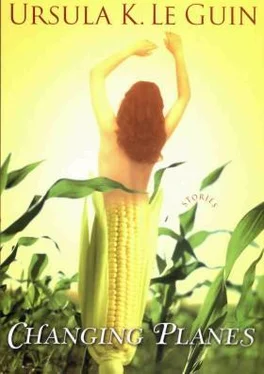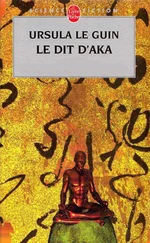I was curious why none of this had happened. The Yendi-ans were apparently so uninterested in their chance to be immortal that there was scarcely anything about it in the library.
But I could see, as the boat drew close to the town, that the travel agent had been a bit disingenuous. There had been hotels here—a couple of big ones, four stories. They were all visibly derelict, signs askew, windows boarded or blank.
The boatman, a shy young man, rather nice-looking as well as I could tell through his gauze envelope, said, “Hunters’ lodge, ma’am?” into my translatomat. I nodded and he sailed us neatly to a small jetty at the north end of the docks. The waterfront too had seen better days. It was now sagging and forlorn, no ships, only a couple of trawlers or crabbers. I stepped up onto the dock, looking about nervously for flies; but there were none at the moment. I tipped the boatman a couple of radio, and he was so grateful he took me up the street, a sad little street, to the diamond hunters’ lodge. It consisted of eight or nine decrepit cabins managed by a dispirited woman who, speaking slowly but without any commas or periods, said to take number 4 because the screens were the best ones breakfast at eight dinner at seven eighteen radio and did I want a lunch packed a radio fifty extra.
All the other cabins were unoccupied. The toilet had a little, internal, eternal leak, link… tink, which I could not find the source of. Dinner and breakfast arrived on trays, and were edible. The flies arrived with the heat of the day, plenty of them, but not the thick fearsome swarms I had expected. The screens kept them out, and the gauze suit kept them from biting. They were small, weak-looking, brownish flies.
That day and the next morning, walking about the town, the name of which I could not find written anywhere, I felt that the Yendian tendency to depression had bottomed out here, attained nadir. The islanders were a sad people. They were listless. They were lifeless. My mind turned up that word and stared at it.
I realised I’d waste my whole week just getting depressed if I didn’t rouse up my courage and ask some questions. I saw my young boatman fishing off the jetty and went to talk to him.
“Will you tell me about the immortals?” I asked him, after some halting amenities.
“Well, most people just walk around and look for them. In the woods,” he said.
“No, not the diamonds,” I said, checking the translatomat. “I’m not really very interested in diamonds.”
“Nobody much is any more,” he said. “There used to be a lot of tourists and diamond hunters. I guess they do something else now.”
“But I read in a book that there are people here who live very, very long lives—who actually don’t die.”
“Yes,” he said, placidly.
“Are there any immortal people in town? Do you know any of them?”
He checked his fishing line. “Well, no,” he said. “There was a new one, way back in my grandpa’s time, but it went to the mainland. It was a woman. I guess there’s an old one in the village.” He nodded towards the inland. “Mother saw it once.”
“If you could, would you like to live a long time?”
“Sure!” he said, with as much enthusiasm as a Yendian is capable of. “You know.”
“But you don’t want to be immortal. You wear the fly gauze.”
He nodded. He saw nothing to discuss, in all this. He was fishing with gauze gloves, seeing the world through a mesh veil. That was life.
The storekeeper told me that you could walk to the village in a day and showed me the path. My dispirited landlady packed me a lunch. I set out next morning, attended at first by thin, persistent swarms of flies. It was a dull walk across a low, dafnp landscape, but the sun was mild and pleasant, and the flies finally gave up. To my surprise, I got to the village before I was even hungry for lunch. The islanders must walk slowly and seldom. It had to be the right village, though, because they spoke only of one, “the village,” again no name.
It was small and poor and sad: six or seven wooden huts, rather like Russian izbas, stilted up a bit to keep them from the mud. Poultry, something like guinea fowl but mud-brown, scuttled about everywhere, making soft, raucous noises. A couple of children ran away and hid as I approached.
And there, propped up next to the village well, was the figure Postwand had described, just as he had described it—legless, sexless, the face almost featureless, blind, with skin like badly burned bread, and thick, matted, filthy white hair.
I stopped, appalled.
A woman came out of the hut to which the children had run. She came down the rickety steps and walked up to me. She gestured at my translatomat, and I automatically held it out to her so she could speak into it.
“You came to see the Immortal,” she said.
I nodded.
“Two radio fifty,” she said.
I got out the money and handed it to her.
“Come this way,” she said. She was poorly dressed and not clean, but a fine-looking woman, thirty-five or so, with unusual decisiveness and vigor in her voice and movements.
She led me straight to the well and stopped in front of the being propped up in a legless canvas fisherman’s chair next to it. I could not look at the face, nor the horribly maimed hand. The other arm ended in a black crust above the elbow. I looked away from that.
“You are looking at the Immortal of our village,” the woman said in the practiced singsong of the tour guide. “It has been with us for many many centuries. For over one thousand years it has belonged to the Roya family. In this family it is our duty and pride to look after the Immortal. Feeding hours are six in the morning and six in the evening. It lives on milk and barley broth. It has a good appetite and enjoys good health with no sicknesses. It does not have udreba. Its legs were lost when there was an earthquake one thousand years ago. It was also damaged by fire and other accidents before it came into the care of the Roya family. The legend of my family says that the Immortal was once a handsome young man who made his living for many lifetimes of normal people by hunting in the marshes. This was two to three thousand years ago, it is believed. The Immortal cannot hear what you say or see you, but is glad to accept your prayers for its well-being and any offerings for its support, as it is entirely dependent on the Roya family for food and shelter. Thank you very much. I will answer questions.”
After a while I said, “It can’t die.”
She shook her head. Her face was impassive; not unfeeling, but closed.
“You aren’t wearing gauze,” I said, suddenly realising this. “The children weren’t. Aren’t you—”
She shook her head again. “Too much trouble,” she said, in a quiet, unofficial voice. “The children always tear the gauze. Anyhow, we don’t have many flies. And there’s only one.” * It was true that the flies seemed to have stayed behind, in the town and the heavily manured fields near it.
“You mean there’s only one immortal at a time?”
“Oh, no,” she said. “There are others all around. In the ground. Sometimes people find them. Souvenirs. The really old ones. Ours is young, you know.” She looked at the Immortal with a weary but proprietary eye, the way a mother looks at an unpromising infant.
“The diamonds?” I said. “The diamonds are immortals?”
She nodded. “After a really long time,” she said. She looked away, across the marshy plain that surrounded the village, and then back at me. “A man came from the mainland, last year, a scientist. He said we ought to bury our Immortal. So it could turn to diamond, you know. But then he said it takes thousands of years to turn. All that time it would be starving and thirsty in the ground and nobody would look after it. It is wrong to bury a person alive. It is our family duty to look after it. And no tourists would come.”
Читать дальше









